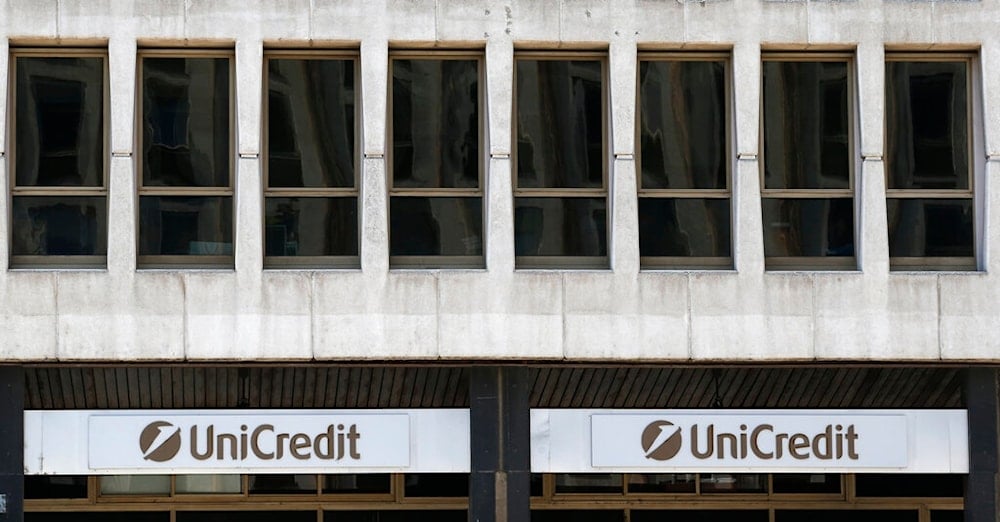Massive wave of EU divestment targets Israeli firms amid Gaza genocide
Foreign direct investment into "Israel" fell by 29% in 2023, the lowest since 2016.
-

A view of a UniCredit Bank branch in Milan, Italy, Tuesday, Aug. 2, 2016. (AP)
Several leading European financial institutions have scaled back their investments and cut links with Israeli companies due to growing activist and governmental pressure to address "Israel's" genocidal campaign in Gaza, according to a Reuters analysis.
Banks and insurers, traditionally vocal about their environmental and social governance commitments, are now reconsidering their financial associations with firms linked to the Israeli defense sector and occupied Palestinian territories.
Italy's UniCredit has reportedly placed "Israel" on a "forbidden" investment list since October 2023, marking a move aligned with its policy against financing arms exports to conflict zones.
This stance goes beyond Italy's official guidelines on arms exports to "Israel".
Meanwhile, Norwegian asset manager Storebrand and French insurer AXA have sold off shares in Israeli companies, including some banks, citing ethical concerns over human rights risks.
"The power banks wield in deciding where to allocate capital has real-world implications," noted Martin Rohner, executive director of the Global Alliance for Banking on Values. "Investing in arms production conflicts with sustainable development principles."
Read more: French insurance giant AXA cuts ties with major Israeli banks: BDS
Sharp drop in FDIs
The war's impact on "Israel's" economy is becoming evident. Foreign direct investment into "Israel" fell by 29% in 2023, the lowest since 2016, as major international funds, including Ireland's Strategic Investment Fund, exit Israeli holdings.
Norway's $1.8 trillion sovereign wealth fund is also weighing the ethical standards of its investments in "Israel", particularly those linked to the occupied territories.
Governments are increasingly taking positions on the war. Norway, Ireland, and Spain have recognized Palestinian statehood, while French President Emmanuel Macron has advocated for an arms export halt, and the UK has suspended certain arms licenses to "Israel".
The UN's 2020 list of companies with settlement ties remains a critical factor in investment decisions for several European firms, including AXA, which significantly reduced its stake in Israeli banks.
Read more: Carrefour closes Jordan branches amid boycott over 'Israel' support
Capital flight surges 62%
Israeli-based daily business Calcalist recently published an in-depth analysis revealing a dramatic 62% increase in capital flight from "Israel" since October 7, 2023.
This surge in capital outflow, the report noted, has been exacerbated by the political and economic uncertainties following the formation of the extremist government led by Prime Minister Benjamin Netanyahu, Bezalel Smotrich, and Itamar Ben-Gvir.
According to the report, capital flight refers to the rapid exodus of financial assets from a country due to various risks, including political instability, social unrest, or geopolitical tensions.
In "Israel’s" case, the combination of escalating geopolitical risks, internal discord, and financial uncertainty has led investors to lose confidence in the Israeli economy and move their assets abroad.
The weakening of the Israeli shekel is one clear indicator of this phenomenon. The currency has fallen by about 10% since the new government took office and has fluctuated dramatically due to market instability.
Experts from Calcalist also highlight that the regime's net financial outflows turned negative in the second quarter of 2023, with the third quarter showing a stark net outflow of $21 billion—marking a significant shift from the surplus of $1.25 billion recorded earlier.
Read more: Israeli shekel; one of the world’s worst performers since August

 3 Min Read
3 Min Read








